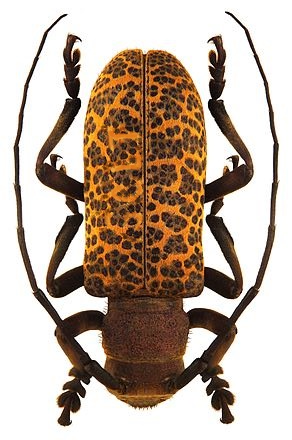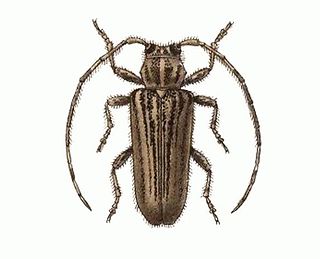
Truncatella guerinii is a species of very small land snail that lives at the edge of the sea, a gastropod mollusk in the family Truncatellidae.

Truncatella is a genus of very small land snails with an operculum, terrestrial gastropod mollusks in the family Truncatellidae. These minute snails live in land habitats close to seawater. They walk with a looping action, and the adults have truncated shells. Many of the species are small enough to be considered micromollusks.
Truncatella may refer to:
The fungal genus Truncatella in the family Sporocadaceae, and in the Amphisphaeriales order, includes plant pathogens such as Truncatella laurocerasi.

Mesophleps is a genus of moths in the family Gelechiidae. The genus was erected by Jacob Hübner in 1825.

Truncatella pulchella is a species of very small land snail that lives at the edge of the sea, a gastropod mollusk in the family Truncatellidae. This species lives on coastlines in the tropical western Atlantic.

Truncatella subcylindrica is a species of small land snail that lives at the edge of the sea. It has gills and an operculum and is gastropod mollusk or micromollusk in the family Truncatellidae.

Truncatella caribaeensis is a species of a very small somewhat amphibious land snail with a gill and an operculum, a semi-terrestrial gastropod mollusk or micromollusk in the family Truncatellidae, the truncatella snails or looping snails. These tiny snails live in damp habitat that is very close to the edge of the sea; they can tolerate being washed with saltwater during especially high tides. These snails are sometimes listed as land snails and at other times they are listed as marine snails.
Truncatella clathrus is a species of very small somewhat amphibious land snail with a gill and an operculum, a semi-terrestrial gastropod mollusk or micromollusk in the family Truncatellidae, the truncatella snails or looping snails. These tiny snails live in damp habitat that is very close to the edge of the sea; they can tolerate being washed with saltwater during especially high tides. These snails are sometimes listed as land snails and at other times they are listed as marine snails.

Truncatella californica, common name of the Californian truncatella, is a species of very small amphibious snail, a gastropod mollusk in the family Truncatellidae.

August Bernhard Brauer was a German zoologist.
Mesophleps truncatella is a moth of the family Gelechiidae. It is found in Australia and Vanuatu.

Estola is a genus of longhorn beetles of the subfamily Lamiinae, containing the following species:
Estola benjamini is a species of beetle in the family Cerambycidae. It was described by Stephan von Breuning in 1940. It is known from Colombia.
Estola brunnescens is a species of beetle in the family Cerambycidae. It was described by Stephan von Breuning in 1940. It is known from Colombia and Venezuela.
Estola nigropunctata is a species of beetle in the family Cerambycidae. It was described by Stephan von Breuning in 1940. It is known from Brazil.
Estola freyi is a species of beetle in the family Cerambycidae. It was described by Stephan von Breuning in 1955. It is known from Trinidad.

Estola vittulata is a species of beetle in the family Cerambycidae. It was described by Henry Walter Bates in 1874. It is known from Panama, Mexico and Venezuela.
Estola insularis is a species of beetle in the family Cerambycidae. It was described by Blair in 1933.
Epuraea truncatella is a species of sap-feeding beetle in the family Nitidulidae. It is found in North America.








